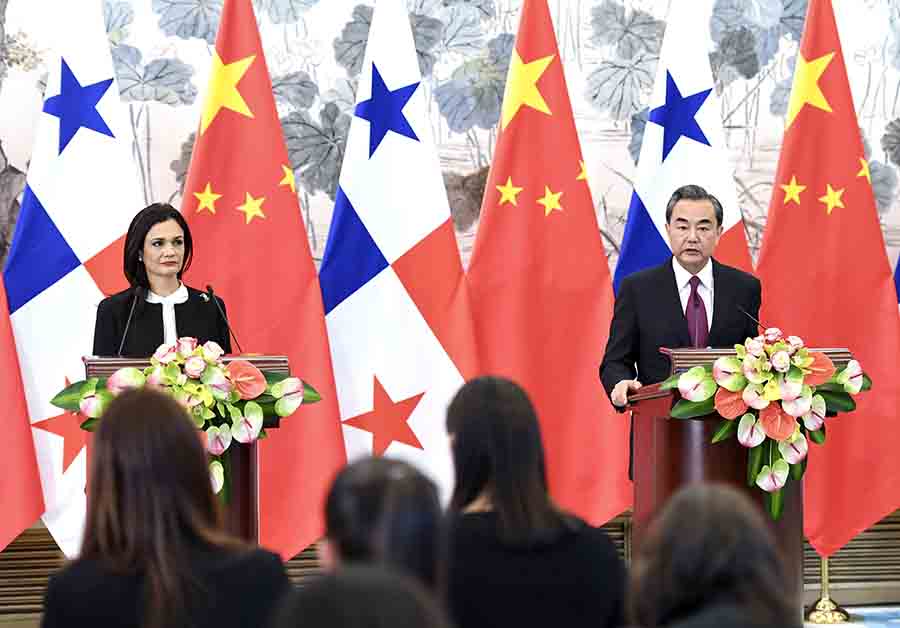Media Report

- The New York Times reports: "Panama has severed diplomatic relations with Taiwan in favor of recognizing China, the latest in a series of developments adding to the island's isolation on the world stage and raising questions about waning American influence under President Trump. Panama's decision handed Beijing a diplomatic victory at a time when Mr. Trump, in hopes of securing cooperation on issues like trade and North Korea's nuclear ambitions, has retreated from the confrontational stances he took toward China as a candidate. Mr. Trump's marked warming toward China since he became president — after a rocky start that included a phone conversation with Taiwan's president, Tsai Ing-wen — has created a diplomatic vacuum in some regions of the world. That has, in turn, made it even harder for countries like Panama to resist political and economic enticements from China, according to analysts...The development was a major diplomatic setback for Taiwan. Ms. Tsai visited Panama last summer, shortly after taking office, for the opening of an expanded Panama Canal. The first ship to sail through the expanded canal was a Chinese one."
- The Washington Post reports: "China is a step closer to allowing imports of U.S. beef for the first time in almost 14 years. The United States and China have agreed on final details of a deal to allow the imports. That's from the Agriculture Department on Monday. The agreement is one part of a bilateral agreement reached following President Donald Trump's meeting with Chinese President Xi Jinping (shee jihn-peeng) in April. China imposed a ban on American beef in 2003 after a case of mad-cow disease, a ban that remained in place despite extensive efforts by the Bush and Obama administrations to get it removed."
- Foreign Affairs comments: "The South China Sea is fast becoming the world's most important waterway. As the main corridor between the Indian and Pacific Oceans, the sea carries one-third of global maritime trade, worth over $5 trillion, each year, $1.2 trillion of it going to or from the United States. The sea's large oil and gas reserves and its vast fishing grounds, which produce 12 percent of the world's annual catch, provide energy and food for Southeast Asia's 620 million people. But all is not well in the area...Despite the enormous stakes, the United States has failed to stop China's assertiveness in the South China Sea. For the most part, Washington has believed that as China grew more powerful and engaged more with the world, it would naturally come to accept international rules and norms...In order to alter China's incentives, the United States should issue a clear warning: that if China continues to construct artificial islands or stations powerful military assets, such as long-range missiles or combat aircraft, on those it has already built, the United States will fundamentally change its policy toward the South China Sea. Shedding its position of neutrality, Washington would stop calling for restraint and instead increase its efforts to help the region's countries defend themselves against Chinese coercion."
Calendar
- 2017-06-12 Protests Opposing China’s Crackdown on Housing Speculation Swell
- 2017-06-11 China Holds Firm to Its $5 Trillion Anchor as Fed, ECB Seek Exit
- 2017-06-09 The U.S. Is Ahead of China in AI Innovation—for Now
- 2017-06-08 China’s trade growth rebounds in May
- 2017-06-07 China Criticizes Pentagon Report, Laments U.S. ‘Cold War Mentality’
- 2017-06-06 California, China defy U.S. climate retreat with new cleantech tie-up
- 2017-06-05 Turning Against Trump: How the Chinese Covered the Climate Pact Exit
- 2017-06-04 On Climate, China Should Think Small
- 2017-06-02 Trump Hands the Chinese a Gift: The Chance for Global Leadership
- 2017-06-01 As U.S. retreats, EU and China seek climate leadership at summit
News
- The New York Times Panama Establishes Ties With China, Further Isolating Taiwan
- The Washington Post China a step closer to resuming US beef imports
- The Wall Street Journal U.S. Asks China to Crack Down on Shadowy Firms That Trade With North Korea
- Bloomberg China's Bond Link Faces Familiar Hurdles for Wary Foreigners
- The Wall Street Journal Australia's China Predicament
- The New York Times 'No Such Thing as Justice' in Fight Over Chemical Pollution in China
- The Financial Times China drive to relocate millions of rural poor runs into trouble
- The Financial Times Why China no longer fears the Fed
- The New York Times Australian Casino Company's Employees Face Charges in China
- Reuters China upholds strict electric car sales quotas despite industry protests
- Bloomberg U.S. Bears Return to China With Shorts Circling $6 Billion ETFs
- Reuters Australia's Crown says China staff now charged, ending eight-month limbo
- USA Today What is the 'One China' policy?
Commentary
- Foreign Affairs Course Correction
- Foreign Policy Trump's Trade Restrictions Could Miss China and Slam Everybody Else
- The Diplomat After Joint Military Exercise in South China Sea, US Warship Visits China
- The New Yorker China and the Closing of the Ivory Trade
- The Hill US, China strike deal on beef exports
- Newsweek China Extends Internet Crackdown with Ban on Celebrity Gossip
- Bloomberg Views China's Skyscraper Age Is Over